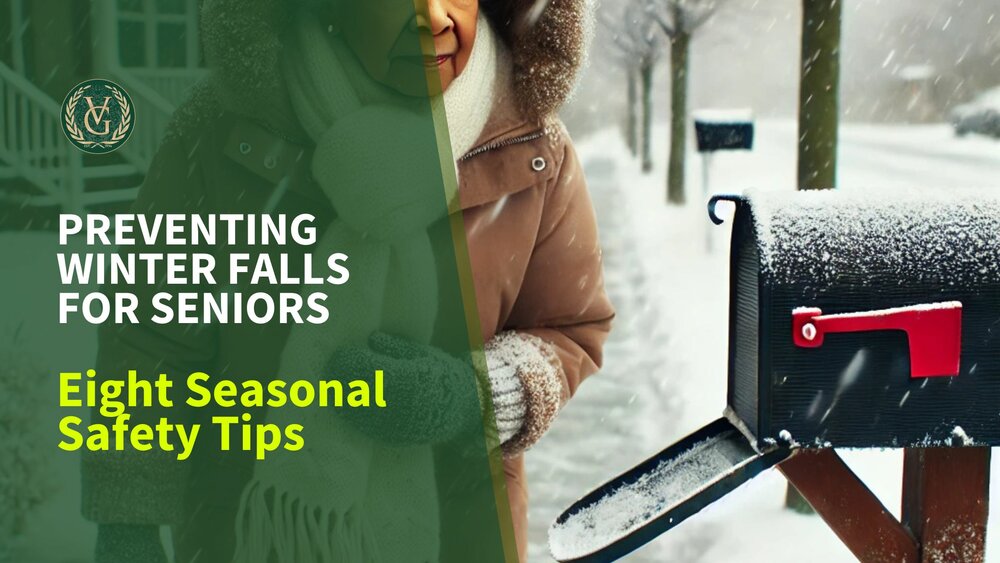Preventing Winter Falls for Seniors: Eight Seasonal Safety Tips
Preventing winter falls should be a top priority for older adults, as even a minor slip can lead to serious injuries.
Winter weather is here, and that means an increased risk for slips and falls. While snow and ice can be dangerous for anyone, they can be especially perilous for older adults. Seniors are more likely to have vision and balance deficiencies, making the consequences of falling are more severe. Consider these sobering facts:
- Falls are the leading cause of injury and death for people 65 and over in the United States, according to the Centers for Disease Control and Prevention (CDC).
- Emergency departments treat three million people in that age group annually, seeking care after falls for broken bones, head injuries, and other issues.
- More than one in three seniors who are hospitalized for a fall are discharged to a long-term care facility.
Fortunately, with some preparation and smart precautions, many of these injuries can be avoided. Please read on to discover eight helpful tips for preventing winter falls.
1. Stay indoors.
When hazardous weather strikes, make every effort to stay home until conditions improve. Prepare in advance by stocking up on food, water, paper goods, emergency equipment, and medications. If you run short on food, consider using a grocery or restaurant delivery service. If you need to see a doctor, ask about virtual appointments by phone or video. If you need assistance in some other way, seek help from family members, friends, or neighbors. If you must go out, take it slow and allow plenty of time.
2. Purchase the right cold weather gear.
A well-insulated, waterproof coat will keep you warm and dry, especially in rainy or snowy weather, and prevent heat loss. Layering clothing underneath, such as thermal shirts or sweaters, can provide additional warmth. Accessories like scarves, hats, and gloves are essential for added protection, as they cover vulnerable areas like your neck, head, and hands.
3. Invest in the proper footwear.
The key to winter fall prevention is wearing appropriate footwear with the right amount of traction. Icy and snowy weather can worsen balance issues and cause slips that result in devastating injuries. Shoes with non-slips soles and good traction allow you to get a better grip on the ground. It’s also essential to ensure that footwear fits properly. If it’s too tight or too list, it can result in slips and falls. Many seniors prefer shoes with Velcro straps that can be easily adjusted.
4. Keep walkways clear.
When rain or melted snow freezes, it creates dangerous, slippery surfaces. Pay close attention to walkways and driveways for icy buildup or black ice. Ideally, arrange for family, friends, or neighbors to assist in clearing walkways of snow and ice regularly during the winter months to prevent accidents.
5. Use mobility aids.
Balance declines and the feet become less sensitive with age, and illnesses like diabetes and arthritis can worsen these conditions. Many seniors use medications that can cause side effects like dizziness, affecting balance and increasing the risk of slips and falls. Mobility aids such as canes and walkers can be helpful for senior citizens, especially during the colder months when ice and snow are a threat. Consider using a four-pronged cane for added stability.
6. Dress warmly whenever you venture outdoors.
Though it may seem harmless to get the mail in your robe and slippers, doing so increases your chances of injury or exposure if you take a tumble on an icy driveway or sidewalk. Wear a coat, gloves, and footwear with good traction, even if you are just stepping outside the door.
7. Walk with care.
Adopt a walking style that improves stability and reduces the risk of falls. Slow down your pace and take wider steps, which helps to maintain better balance and control. Keep your feet closer to the ground, and avoid walking too quickly, especially on slippery surfaces. Be sure to stay alert to your surroundings, watch for obstacles, and wear supportive footwear.
8. Be prepared for emergencies.
Keep a phone or safety device on your person at all times. It can literally be a lifesaver in an emergency situation. It’s also wise to keep a small bag of sand or cat litter in your pocket that you can sprinkle on icy surfaces, if needed.
The winter months can be treacherous for older adults. While you can’t control the weather, you can take charge of your preparedness and safety.
Staying healthy is easier when you’re armed with the right information. If you need additional resources about preventing winter falls, we are here to help. Please reach out to our caring professionals anytime.
About Vaughn Greene Funeral Services: For more than 25 years, Vaughn Greene Funeral Services has been providing a ministry of care to Baltimore’s African American community. As a leading local, minority- and family-owned provider, we promise to provide our highest level of service and respect to families who entrust us to honor their loved ones. For more information about our funeral, cremation, memorial, repast, and grief counseling services, please call us at 410.655.0015 or visit us online at https://vaughncgreene.com/.











Comments